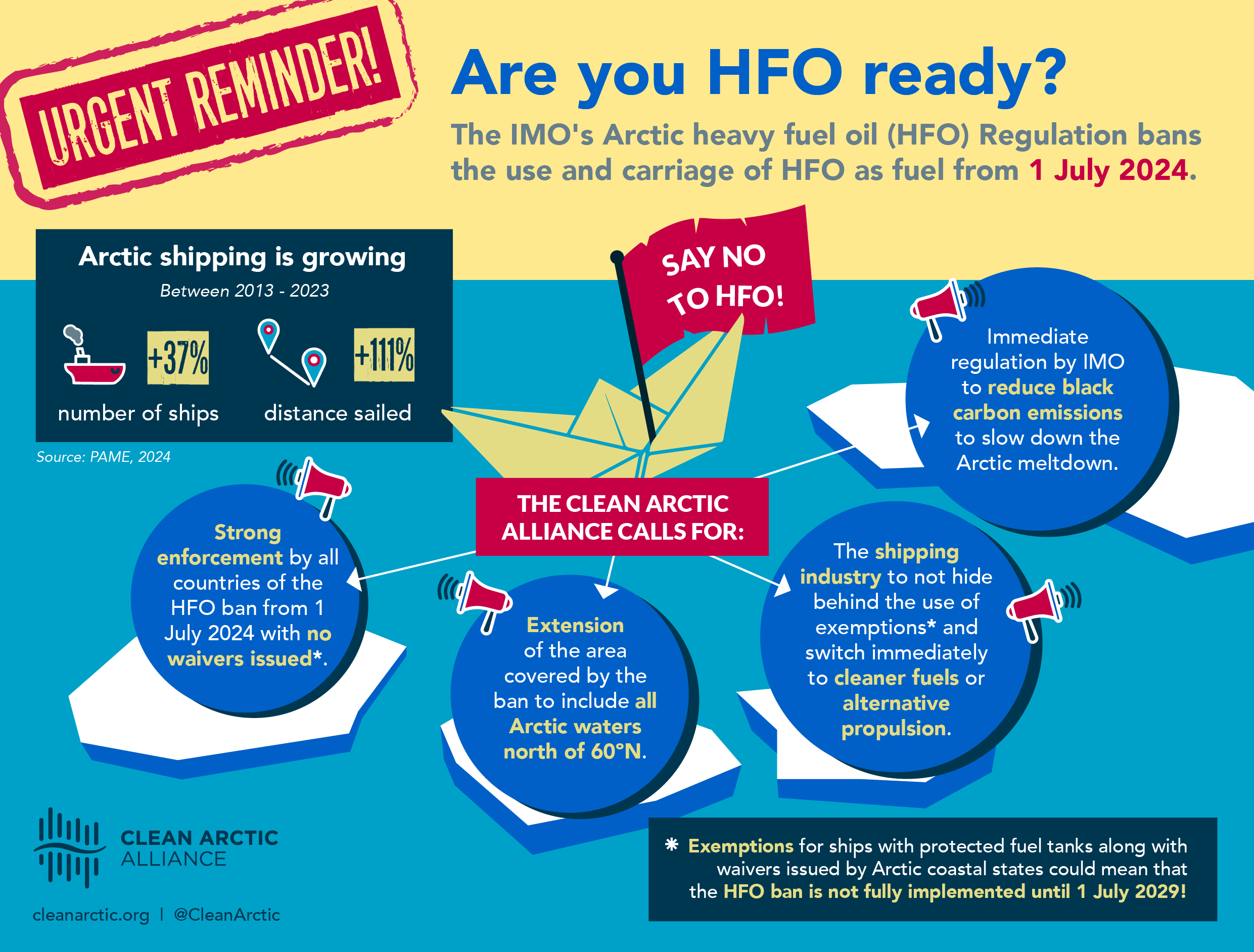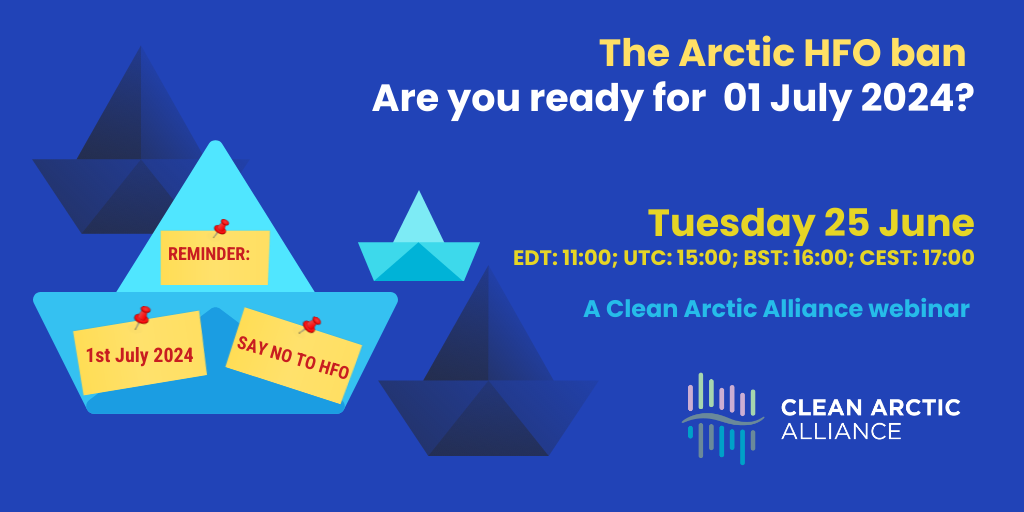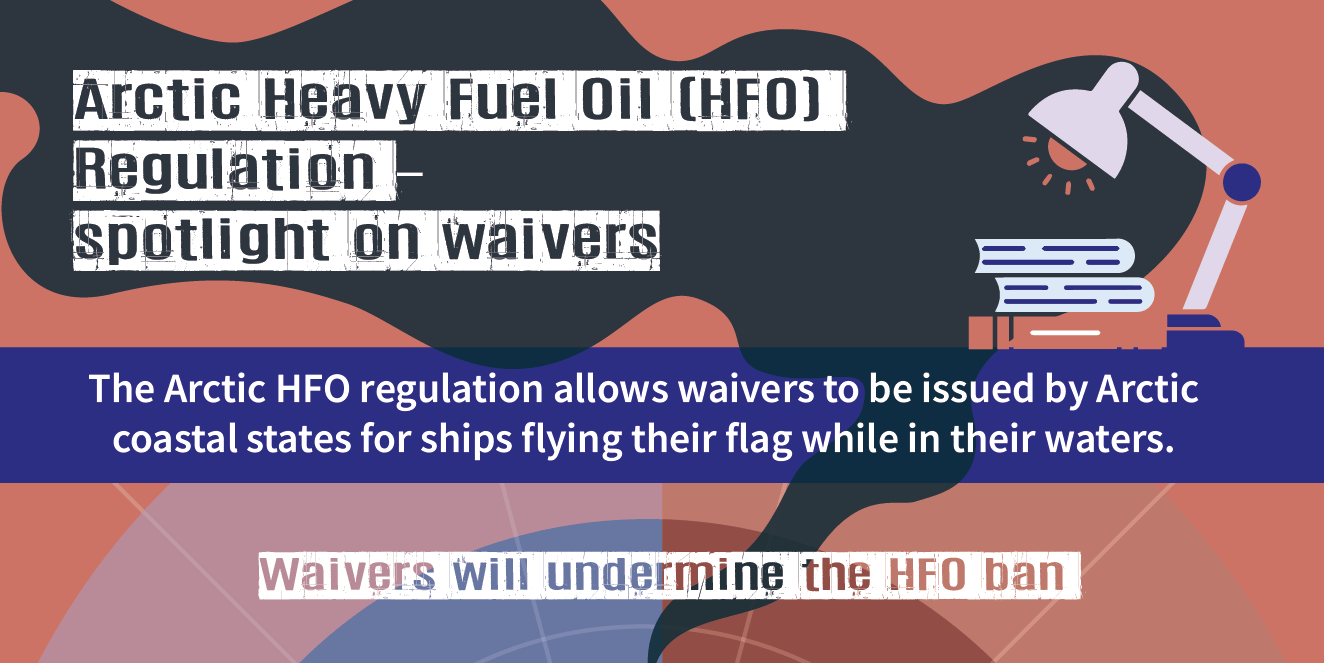
See also: Everything You Need to Know About the July 1st Heavy Fuel Oil Ban
1 July 2024:– As an International Maritime Organization (IMO) ban on the use and carriage heavy fuel oil (HFO) by Arctic shipping comes into force today, the Clean Arctic Alliance calls on IMO member states, particularly Arctic coastal countries, to implement the Arctic HFO ban and enforce it fully with immediate effect – without resorting to loopholes.
The Alliance is also calling on the IMO to extend the area covered by the ban to include all Arctic waters north of 60oN, and to enact regulation to reduce black carbon emissions from shipping, which would help reverse the impacts of climate warming in the Arctic, through the use of cleaner fuels and diesel particulate filters. Recent Arctic Council studies of ship activity in the Arctic have shown an increase of 37 percent between 2013 and 2023 and a 111 percent increase in total distance travelled over the same time period.
In recent days, an Irish vessel, the Arklow Wind, was fined by authorities in Svalbard for carrying heavy fuel oil. In Norwegian waters around the island archipelago of Svalbard the use and carriage of HFO has been banned since 2022, it has been forbidden to carry or use heavy fuel oil in territorial waters around the Arctic archipelago.

The International Maritime Organization has already formally recognised that black carbon is the second largest source of ship climate warming, and it is responsible for around 20% of shipping’s climate impact (on a 20 year basis). Black carbon has a disproportionately high impact when released in and near the Arctic – when emitted from the exhausts of ships burning oil-based fuel and settles onto snow and ice, it accelerates melting and the loss of reflectivity – the albedo effect – which creates a feedback loop that further exacerbates local and global heating.
The prohibition on use and carriage of polluting heavy fuel oil was agreed by the IMO in June 2021, but received criticism for including significant loopholes allowing countries to grant waivers, and for shipping companies to make use of exemptions for many vessels – meaning that the ban will only reach full speed in 2029. Until then, HFO will no longer be allowed to be used or carried for use while sailing in Arctic waters, unless a ship has a protected fuel tank or has been issued with a waiver by an Arctic coastal nation – this leaves around 74% of Arctic shipping unaffected by the ban. Recent Arctic Council studies of ship activity in the Arctic have shown an increase of 37 percent between 2013 and 2023 and a 111 percent increase in total distance travelled over the same time period.

“Governments and NGOs fought long and hard to achieve the ban on the use and carriage of HFO in the Arctic – yet see that it will be half-implemented is quite simply not good enough”, said Dr Sian Prior, Lead Advisor to the Clean Arctic Alliance .”IMO Member States, especially Arctic coastal countries, must go farther than the IMO ban by implementing it in ways that truly protect the Arctic from HFO spills and black carbon emissions – and that means refusing to offer loopholes to the shipping industry”.
“In addition, by implementing strong HFO regulations, the IMO can significantly reduce the risk of HFO spills and also see co-benefits – reducing air pollution, and slowing down the impacts of climate warming on the Arctic”, said Prior. “Combining better fuel choices today with the use of existing technology, ships operating in the Arctic would see black carbon or soot (a component of particulate matter) emissions reductions of more than 90%. As black carbon remains in the atmosphere for only a short period of time, if all shipping in the Arctic used lighter distillate fuels and installed diesel particulate filters – existing technology long used in land transport to reduce diesel fuel emissions – we would see rapid removal of a massive threat to Arctic sea ice – which is crucial for balancing the climate and weather in the Arctic and further afield.”
“Today, July 1st is an incredible opportunity for the shipping industry to demonstrate that it is willing to embrace a cleaner future”, added Prior. Instead of hiding behind the use of exemptions, shipping companies can switch to readily available, relatively cleaner fuels such as diesel or distillate marine fuels (e.g. DMA, DMZ) or to alternative forms of propulsion and install diesel particulate filters.”
“The use of scrubbers must be avoided – they are an excuse to keep using HFO, while transferring air pollution into marine pollution and moving to gas fossil fuels such as LNG simply replaces one potent short-lived but high impact climate pollutant – black carbon – with another – methane. Use of diesel fuel along with the installation of particulate filters or precipitators, as prescribed for other forms of transport, can reduce emissions of black carbon by more than 90 percent quickly and be a solid first step on route to decarbonisation”, concluded Prior.
About Heavy Fuel Oil
Already banned for since 2011 in Antarctica and in all the waters around the Arctic archipelago of Svalbard from January 2022, heavy fuel oil is a viscous and polluting fossil fuel that powers ships throughout our seas and oceans – accounting for 80% of marine fuel used worldwide. Around 75% of marine fuel currently carried in the Arctic is heavy fuel oil (HFO).
If HFO is spilled in cold polar waters, it is likely to break down very slowly, and prove almost impossible to clean up. A HFO spill would have long-term devastating effects on Arctic indigenous communities, livelihoods and the marine ecosystems they depend upon. As sea ice melts and opens up Arctic waters further, even larger non-Arctic state-flagged vessels running on HFO are likely to divert to Arctic waters in search of shorter journey times, greatly increasing the risks of HFO spills.
Burning HFO produces black carbon particles which are emitted in the exhaust fumes. When they fall on snow, on glacier ice and sea ice, the reflectivity (albedo) is reduced and the absorption of heat increases. More Arctic shipping using HFO will lead to increased black carbon emissions, fueling an already accelerating feedback loop.
Following five years of advocacy and pressure as part of the “HFO Free Arctic” campaign, over a decade after the Arctic Council first concluded that oil spills are the greatest risk posed by shipping, in June 2021 the International Maritime Organization finally adopted a ban on the use and carriage of heavy fuel oil in the Arctic.
However, the ban adopted by the IMO’s Marine Environment Protection Committee is far weaker than was required, leaving the Arctic, its Indigenous communities and its wildlife facing the risk of a HFO spill for another decade.
The IMO ban allows ships in the Arctic to carry and burn significant quantities of HFO in the coming years, resulting in ongoing HFO spill risks, continued high emissions of black carbon, and failure to achieve protection of a region that is rapidly changing due to climate warming.
Read more on the Clean Arctic Alliance website
Are you HFO ready? Clean Arctic Alliance State of Affairs Briefing
Opinion:
- High North News, Opinion: Shipping Industry Must Seize Opportunity Posed by Arctic Heavy Fuel Oil Ban
- The Hill Times: Heavy fuel oil ban coming July 1, Inuit Nunangat communities still vulnerable to marine spills
- Alaska Beacon: Arctic meltdown continues as heavy fuel oil ban begins
- WWF: Despite heavy fuel oil ban, Arctic marine biodiversity still threatened
ENDS
Contact:
Dave Walsh, Communications Advisor, [email protected], +34 691 826 764
About the Clean Arctic Alliance
Made up of 23 not-for-profit organisations, the Clean Arctic Alliance campaigns to persuade governments to take action to protect the Arctic, its wildlife and its people.
Members include: Alaska Wilderness League, Bellona, Clean Air Task Force, Ecology and Development Foundation ECODES, Environmental Investigation Agency, Equal Routes, Eurasian Wildlife and Peoples, Friends of the Earth US, Global Choices, Green Global Future, Green Transition Denmark, Greenpeace, Iceland Nature Conservation Association, International Cryosphere Climate Initiative, Nature And Biodiversity Conservation Union, Ocean Conservancy, Pacific Environment, Seas At Risk, Surfrider Foundation Europe, Stand.Earth, Transport & Environment, WWF and Zero.More more information visit https://www.cleanarctic.org/



